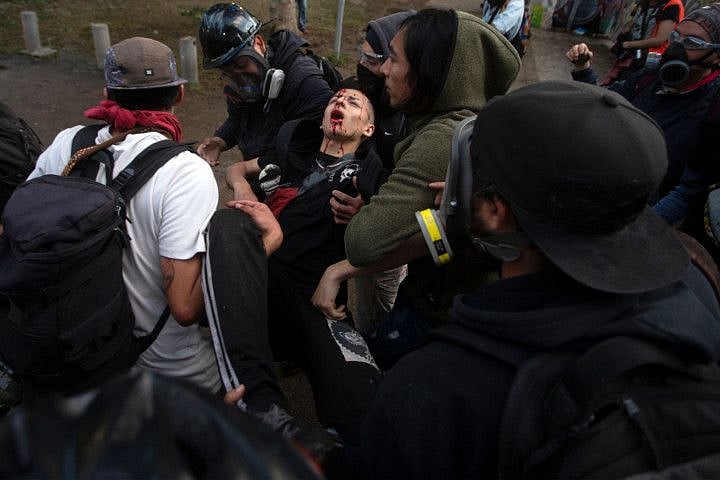In the past two weeks, the worst unrest Chile has seen since the return of democracy in 1990 has forced President Sebastian Pinera to reverse course on a proposed transit increase, and dismiss eight cabinet members. But for Chileans both in Chile and in the diaspora, the government’s violent response to the protesters evokes memories of a dark past.
“We are at war against a powerful enemy,” Pinera declared. He’s backed this up by declaring a state of emergency in much of the country, imposing curfews, and deploying tanks and troops. Videos online capture the brutal force used by the police and military against demonstrators. One recent clip on my Facebook feed shows a protesters peacefully walking single file on the sidewalk. A brigade of soldiers on foot and officers on motorcycles converge on the protesters and beat them with nightsticks.
Chile’s National Human Rights Institute is investigating reports that protesters have been tortured at the Baquedano subway station in Santiago. In the chaos, thousands have been arrested, at least 19 have been killed, and hundreds more injured, though not all by security forces, while 20 people have been reported missing.
We must call this what it is: a gross violation of human rights.
Over 200 law professors have signed an open letter denouncing the violence against the protesters. On Oct. 24 former President Michele Bachelet, now the United Nations High Commissioner for Human Rights, announced that she would be sending a team to investigate.
It has been almost 30 years since Chile transitioned to democracy. Yet these events sound as if they could have occurred during the brutal reign of Gen. Augusto Pinochet, who killed and tortured thousands between 1973 and 1989.
This past Friday more than a million Chileans protested peacefully in Santiago and other cities. Yes, some protests have erupted into looting, arson and violence. The burning of subway stations, buses, supermarkets and more by vandals will have long-term consequences for innocent civilians. But they do not reflect the majority.
Chile is often held up as an exemplary case, a country that shed its repressive past and has become both politically peaceful and economically prosperous. And to an extent it has been. But its Constitution, written in 1980 during Pinochet’s rule, created the legal basis for a market-driven economic model that has privatized pensions, health and education. The Chilean dictatorship destroyed collective bargaining rights; decimated the public education system; and handed over social security programs, health care, utilities and public services to private enterprises.
The effect of those policies still resonate. Chile has one of the highest costs of living in South America. Today the country is considered one of the most unequal in the Organization for Economic Cooperation and Development group of nations.
The proposed transit fare of $1.20 a ride, a nearly 4 percent increase, would have been a heavy burden on low-income families, who spend upward of 13 percent of their budgets on transportation, and retirees who subsist on a fixed pension that is below minimum wage. These affronts were further amplified when Economy Minister Juan Andres Fontaine suggested that Chileans who couldn’t afford the new fare leave for work before 7 a.m. to avoid paying the rush-hour rate.
Chileans are protesting because they are in such financial straits that they have nothing to lose. Many are calling for an assembly to replace the 1980 Constitution, whose provisions require a supermajority to pass key legislation, thus making major policy changes nearly impossible
In the past week, Pinera said his government “has listened to the clear and strong message sent by Chileans.” The curfew has been lifted, and Pinera outlined a plan to reform the pension system, though any changes must be approved by Congress. He also called for raising the monthly minimum wage.
But to the protesters, these actions appear largely symbolic, failing to offer significant changes to Chile’s market-driven economic model. Many are calling for an assembly to replace the 1980 Constitution, whose provisions require a supermajority to pass key legislation, thus making major policy changes nearly impossible.
Poor pensioners, underpaid laborers, schoolteachers and college students are not the enemy of the state. Education reform, social security reform, increased wages, substantial housing subsidies, lowering the costs of public services - these are all reasonable demands that an advanced economy like Chile’s should have the ability to meet. But no significant changes will occur as long as there is still repression in the streets.
—New York Times
Daniel Borzutzky is the author of The Performance of Becoming Human, recipient of the 2016 National Book Award for Poetry.
Sign up for the Daily Briefing
Get the latest news and updates straight to your inbox
Network Links
GN StoreDownload our app
© Al Nisr Publishing LLC 2026. All rights reserved.
